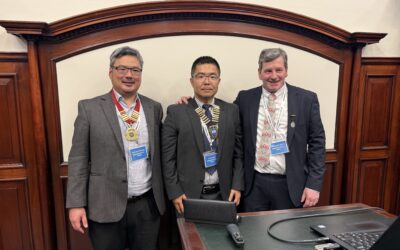The branch was very fortunate to have some excellent speakers for its winter meetings at Robert Gordon University (RGU) which attracted good audiences.
Dr Ed Whyte, principal corrosion engineer, and Paul McCarthy, of Plant Integrity Management (PIM) commenced the Q1 2019 programme with some great insights into the concepts of Maximising Economic Recovery (MER). Ed’s role has encompassed the provision of corrosion and integrity engineering services to PIM’s clients, while Paul is currently involved in various maintenance and inspection optimisation projects for a range of North Sea Operators.
They discussed the historic barriers to MER and how a step change from 60-74% production efficiency has recently been achieved, highlighting that only a 1% increase in efficiency, can dramatically produce an extra 12 million barrels per year in the North Sea, as 2016 figures have demonstrated.
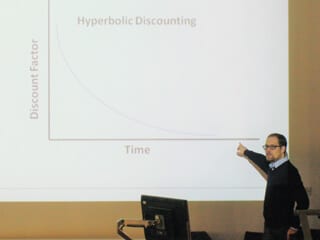
Dr Ed Whyte of Plant Integrity Management (PIM) discusses managing integrity issues v. MER.
The initial UKCS Review (2013), the final Wood Report (2014) and new OGA (2015) UK MER Legislation (2018), have all recognised the importance of reducing UK plant
downtime / lost production. The most high profile MER document being the Wood Review (https://www.ogauthority.co.uk/about-us/what-we-do/the-wood-review/)
Although there has been a continuing downward trend in the number of plant losses, there remains an ever growing demand to limit UK Oil / Gas production outages, so as to maximise what income is available.
Most importantly, the presenters explained how gains to production efficiency can be achieved by approaching integrity management in a very different manner than has been the case before, through taking a long-term (but modular) view, with improved collaboration and engagement, assisted in all this by modern IT tools and devices that control data and costs more effectively.
The McKinsey Global Institute (2017) has studied in detail the longer term economic impact of “short termism”, and industry’s reluctance to invest in larger / longer maintenance projects. McKinsey claim that this figure is as high as 87% of executives and directors that feel pressured to demonstrate strong financial performance within 2 years or less, thus limiting available anti-corrosion / preventative maintenance expenditure.
In line with the McKinsey findings, PIM proposed that large maintenance projects be broken into more manageable / more achievable smaller repair / intervention scopes that target just one specific area or system, under a single project manager. This approach was then explained in greater detail by looking at the specific needs of upcoming CUI / PFP / FM preventative maintenance programmes and how they could be accommodated within this new modular approach to minimise external corrosion risks.
The full text of this most interesting and informative presentation can be seen at: https://www.youtube.com/watch?v=6Y36lf6ApIE
The February meeting was billed as a special Coating / Linings event, with two very knowledgeable presenters, Ajith A Varghese from International Paint Ltd and Gary Carswell of AEGION Group of Companies, who gave most interesting talks on Corrosion under Insulation (CUI) preventative coatings and Anti-Microbial Pipeline Linings, respectively.
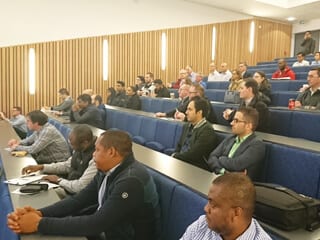
The well attended Special Coatings Event at RGU in February.
Firstly CUI, which is a major issue that causes great cost to industry, and is currently the subject of a major project by the Oil & Gas Technology Centre, Aberdeen (OGTC). CUI poses a significant operational, safety and economic challenge. This is magnified in the North Sea, where many of the assets and infrastructure are operating well beyond their expected design life, and the OGTC vision is to eliminate all corrosion failures due to CUI by 2026.
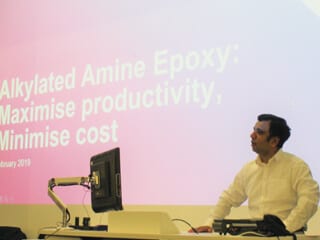
Ajith A Varghese from International Paint presents on alkylated amine epoxies.
Ajith explained in great detail, the mechanisms of CUI, the integrity risks created, and the extensive research and development programmes undertaken in their Newcastle Laboratories. All prevailing ISO and NACE Standards, and their recent amendments, were discussed in the context of developing a new preventative product, and the lengthy but very necessary processes by which this is then taken to market, incorporating lessons learnt from field trials and customer feedback. In particular alkylated amine epoxies were discussed, which have been proven to have superior DFT cracking tolerance to over-application and increased productivity even at low temperatures, compared to standard epoxy phenolic systems.
Gary Carswell then explained in the context of internal corrosion prevention, how the use of protective pipeline liners has been very widely adopted by both the Energy and Non-Energy Sectors.
MIC related pipeline leaks typically account for 40% of all corrosion related failures, thus these compressive and rotational liner insertion processes can bring great advantages and enormous savings by extending the lives of water injection lines offshore and in many water distribution systems onshore. The 47km long Tweedsmuir offshore water injection lining was a prime example of this technology being put into practice for North Sea operations with sections pre-lined before laying.
This technology incorporates anti-microbial mitigation chemicals into the lining system that can then successfully prevent the growth and spread of MIC organisms. Typically a design life of 25yrs is specified for such lining systems but further R&D programmes are working towards a 50 year design life. In service failure of linings is extremely rare, provided adequate care is taken in respect of preparation and across pipeline joints.
Gary explained the many different lining types that protect against internal corrosion, their application systems and different geographical needs, in a very informative manner that was appreciated by all.
Both January and February talks generated many questions from the audience, which were well responded to by the speakers. The talks will be the subject of follow-up technical papers later in Corrosion Management.
Dr Yunnan Gao, the ICorr Aberdeen Chair, congratulated all speakers and presented them with Certificates of Appreciation.
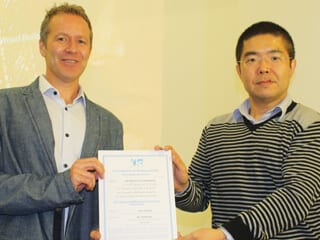
Branch Chair Dr. Yunnan Gao presents a Certificate of Appreciation to Gary Carswell of Aegion.
The next technical evening, which will be run jointly with the Marine Corrosion Forum, will be held on Tuesday 30 April, when Dr. Ian Carpenter of Scaled Solutions, will present a talk on ‘Corrosion Inhibitor Screening: Impact of Test Approaches’ For the convenience of MCF conference attendees, this event will be held at ICorr’s old home, the Palm Court Hotel, starting at 5.30 pm.
Prior to this, a large range of papers will be presented by MCF commencing at 10.30 a.m, including:
• Oilfield reservoir souring; Forecasting of Microbiological sour gas production using the DYNAMICTVS© model, by Matt Streets of Rawwater Engineering.
• A comprehensive approach to Integrity assessment of Critical structural components operating in Marine environments with ASPIRE™ by Sebastian Hartmann, Payam Jamshidi, Innospection and TWI.
• CP inspection and monitoring of Subsea pipelines by Ross Fielding of Impalloy Ltd.
A full list of upcoming presentations can be found at https://www.marinecorrosionforum.org
Looking further ahead, the branch will be hosting its annual full-day Corrosion Awareness course on 27 August 2019, comprising of a number of lectures / presentations focusing on microbiologically influenced corrosion (MIC) in pipeline systems. This year’s CAD programme will include talks by ROSEN specialists and other visiting speakers, on their MIC experiences from global operations covering – Sampling, Analysis, Monitoring of Pipelines for MIC damage, Chemical Mitigation / Cleaning Strategies and finally Inspection, Modelling and Monitoring approaches.
Most certainly this event will provide a very comprehensive introduction, to this very significant and often troublesome area of Corrosion Control / Prevention.
As usual, all branch presentations can be found on: https://sites.google.com/site/icorrabz/resource-center, and full details of future events can be found on the diary page of the magazine and on the website, or by contacting, ICorrABZ@gmail.com



